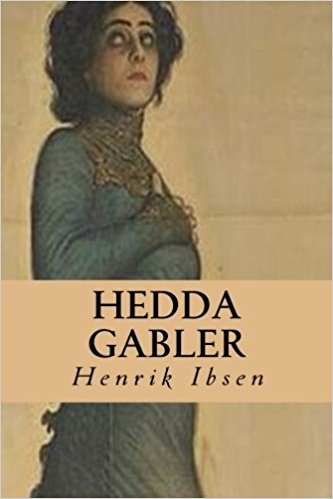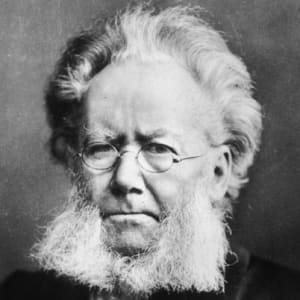Hedda Gabler Summary
6 min read ⌚
 There aren’t many Norwegians more famous than Henrik Ibsen and Hedda Gabler. Interestingly enough, the latter is the maiden name of a girl who never really existed.
There aren’t many Norwegians more famous than Henrik Ibsen and Hedda Gabler. Interestingly enough, the latter is the maiden name of a girl who never really existed.
Read our “Hedda Gabler” summary to find out why she seems more real than some people who have.
Who Should Read “Hedda Gabler”? And Why?
Whether Vera Komissarzhevskaya, Duse, or Nazimova, Mrs. Pat Campbell or Ingrid Bergman, Isabelle Huppert, Jane Fonda or Kate Blanchett – practically anyone who ever meant something in the world of theatre has dreamed of playing Hedda Gabler, a dramatic role as defining as that of a Medea or a Lady Macbeth.
In fact, a role rightfully described as “the female Hamlet.”
And even today, more than a century after its first production, “Hedda Gabler” has lost none of its edge, causing, for example, an uproar in Tehran in 2011 on account of its supposed vulgarity and sexuality.
But, that’s what great art is supposed to do: question, influence, change people’s minds. Ibsen’s “Hedda Gabler” has done just that for a century now.
And there aren’t many works of art you could say the same about.
Read it especially if you are a woman. You may find out something about yourself that you’ve been permitted to up till now.
Henrik Ibsen Biography
Henrik Ibsen was a Norwegian playwright and poet, considered “the father of modern drama” and the best poetic dramatist since William Shakespeare.
was a Norwegian playwright and poet, considered “the father of modern drama” and the best poetic dramatist since William Shakespeare.
In fact, he is also the second most frequently performed playwright after the Bard and, quite possibly, the writer who – alongside Chekhov – has exerted the most influence on the great playwrights of the 19th and 20th century (Shaw, Wilde, Miller, O’Neill, Krleža).
Born into a merchant family in Skien, he became the manager of the National Theater in Christiana (present-day Oslo) before embarking on a self-imposed exile in Italy (Rome) and Germany (Munich), lasting almost three decades.
It was mostly during this period that Ibsen wrote his most famous plays (in Danish). By the time he died in 1906, the great Norwegian writer had left behind him a legacy which many would strive to emulate, but none has so far succeeded, whether in quality or abundance.
His plays include: “Peer Gynt,” “A Doll’s House,” “Hedda Gabler,” “An Enemy of the People,” (adapted later on by Arthur Miller) “Ghosts,” “The Wild Duck,” “Emperor and Galilean,” “When We Dead Awaken,” “Pillars of Society,” “Rosmersholm,” “The Lady from the Sea,” “The Master Builder,” and “John Gabriel Borkman.”
Plot
Hedda Gabler is not actually Hedda Gabler at no point in this play.
She has been – as the daughter of an aristocratic general. But she is also already married, and at the beginning of the play she has just returned from her (six-month!) honeymoon to her villa in Kristiania.
As Hedda Tesman, the wife of a young and aspiring academic who goes by the name of George Tesman and who expects to become a professor in the recent future.
So then, you may ask, why is the play titled “Hedda Gabler”?
Unlike many authors who expect their readers to finish their books for them, Henrik Ibsen never wrote anything without an agenda. And he was ready for these kinds of questions specifically:
“My intention in giving [Hedda] this name was to indicate that Hedda as a personality is to be regarded rather as her father’s daughter than her husband’s wife.”
Duly noted: Hedda Gabler is more defined as the daughter of a deceased enigmatic wealthy general than as the wife of a somewhat dull academician who’d rather spend most of his honeymoon researching his thesis than loving his wife.
OK – he did do some other stuff too, since, though she never admits it, it’s implied that Hedda is pregnant.
It’s also more than implied that Hedda – who, by the way, is a 10 to George’s 6 – doesn’t really love George. She married him because she believed that one day he would be a well-known history scholar.
Enters Thea Elvsted, a married woman looking for Eilert Løvborg, a former colleague of George and his perennial academic rival. Also – a former something of Hedda, and a recovering alcoholic at the present moment.
Eilert, though obviously more talented than George, had wasted his talent for years before he met Thea, an old schoolmate of Hedda. Thanks to her, he has written a bestseller in the same history field George is working.
And he is about to complete its sequel, which should be even more groundbreaking.
In a nutshell, George can’t be that sure of getting that professorship he was all but appointed with. And, consequently, Hedda’s luxurious lifestyle is under serious threat.
But if you think that means something to Hedda, you don’t know Hedda.
Because, you see, Hedda Gabler is not merely a femme fatale; she is the master manipulator, as chameleonic as Frank Abagnale Jr., as scheming as Keyser Söze.
First stop: Thea Elvsted.
Hedda forces her to spit out the truth. She is about to leave her husband for Eilert Løvborg, and she is looking for him because she is afraid that he may start drinking again.
Info collected; time to use it.
Next stop: Eilert Løvborg.
It’s even easier with him since he and Hedda have a history. Of course, it was Hedda who broke that off, because, let’s face it, she would have never tarnished her impeccable reputation by marrying an alcoholic.
Now, she tells him that Thea doesn’t trust him and is afraid that he would start drinking again.
Naturally, she implicitly suggests that he should, encouraging Eilert to join George and his associate – Judge Brack – to a party.
Eilert does, promising to read out loud parts of the manuscript of his masterpiece-to-be at the party.
Of course, it’s the only manuscript.
And, of course, Eilert loses it.
Fortunately, George is the one who finds it and returns it to his villa, with the intention of keeping it safe for his friend – who (surprise! surprise!) is too dead drunk to know what he has written and how much it’s worth.
Unfortunately, George gives the manuscript to none other than Hedda Gabler.
George is called away to his aunt’s house.
Eilert eventually returns to the villa, claiming that he has destroyed the manuscript and that he doesn’t want to have anything with Thea anymore.
Thea blames Eilert for murdering their child – revealing that the book was a joint effort – and storms out of the Gabler’s house.
Now alone, Eilert admits to Hedda that he hasn’t destroyed the manuscript but has simply lost it. Hedda, being Hedda, acts flabbergasted.
And does something you wouldn’t expect even from a Hannibal Lecter: gives Eilert a gun which had previously belonged to her father.
Be sure to shoot yourself in the temple, she says cold-bloodedly, since you deserve a poetic death.
He also deserves to know that he’s talking to a psychopath, but, hey… that’s life for you there.
Hedda Gabler Epilogue
Eilert lied to Thea that he had destroyed his manuscript; Hedda, obviously not wanting history to remember Eilert as a liar, makes sure that he was telling the truth all along: now that he’s off to his poetic death, she actually burns the manuscript.
And she tells George that she has done it to ensure them a better future.
George is quite happy with this – oh, how much my wife loves me, he thinks – but only until the next morning, when Judge Brack comes to tell the Gablers and Mrs. Elvsted that Eilert had committed suicide.
Grief-stricken, George and Thea decide to reconstruct the book using Thea’s and Eilert’s notes.
Now alone, Judge Brack tells Heda that Eilert’s death was not that beautiful and poetic: he didn’t shoot himself in the temple, but accidentally in the groin.
And oh – Judge Brack adds – I recognized the gun. But don’t worry – I’ll tell no one. That is… if you do me a favor or two.
By this point, the reader already knows something Judge Brack doesn’t: Hedda Gabler is always the manipulator, and never the manipulatee.
So, much like Richard Cory, Hedda Gabler goes to her smaller room and puts a bullet through her head.
Like this summary? We’d like to invite you to download our free 12 min app, for more amazing summaries and audiobooks.
Hedda Gabler PDF Quotes
BRACK: Fortunately, the nuptial journey is at an end… HEDDA: The journey’ll be a long one… a long one yet, I’ve just come to a stopping-place on the line. Share on X HEDDA: My impulsiveness had its consequences, my dear Mr. Brack. BRACK: Unfortunately… impulsiveness does that only too frequently, my lady. Share on X HEDDA: Oh courage… oh yes! If only one had that… Then life might be livable, in spite of everything. Share on X MRS. ELVSTED: You’ve got some reason for all this, Hedda! HEDDA: Yes, I have. For once in my life I want to feel that I control a human destiny. MRS. ELVSTED: But surely you do already? HEDDA: I don’t, and I never have done. Share on X HEDDA: It’s a liberation to know that an act of spontaneous courage is yet possible in this world. An act that has something of unconditional beauty. Share on XOur Critical Review
“In the entire history of literature,” wrote once critic Martha Fletcher Bellinger, “there are few figures like Ibsen. Practically his whole life and energies were devoted to the theater; and his offerings, medicinal and bitter, have changed the history of the stage.”
“Hedda Gabler” is undoubtedly one of the most recognizable among them. It’s about freedom and women, about manipulation and sex.
And it’s exceptional.
Emir is the Head of Marketing at 12min. In his spare time, he loves to meditate and play soccer.







